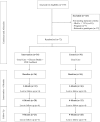Diabetes self-management smartphone application for adults with type 1 diabetes: randomized controlled trial
- PMID: 24225149
- PMCID: PMC3841374
- DOI: 10.2196/jmir.2588
Diabetes self-management smartphone application for adults with type 1 diabetes: randomized controlled trial
Abstract
Background: Persistently poor glycemic control in adult type 1 diabetes patients is a common, complex, and serious problem initiating significant damage to the cardiovascular, renal, neural, and visual systems. Currently, there is a plethora of low-cost and free diabetes self-management smartphone applications available in online stores.
Objective: The aim of this study was to examine the effectiveness of a freely available smartphone application combined with text-message feedback from a certified diabetes educator to improve glycemic control and other diabetes-related outcomes in adult patients with type 1 diabetes in a two-group randomized controlled trial.
Methods: Patients were recruited through an online type 1 diabetes support group and letters mailed to adults with type 1 diabetes throughout Australia. In a 6-month intervention, followed by a three-month follow-up, patients (n=72) were randomized to usual care (control group) or usual care and the use of a smartphone application (Glucose Buddy) with weekly text-message feedback from a Certified Diabetes Educator (intervention group). All outcome measures were collected at baseline and every three months over the study period. Patients' glycosylated hemoglobin levels (HbA1c) were measured with a blood test and diabetes-related self-efficacy, self-care activities, and quality of life were measured with online questionnaires.
Results: The mean age of patients was 35.20 years (SD 10.43) (28 male, 44 female), 39% (28/72) were male, and patients had been diagnosed with type 1 diabetes for a mean of 18.94 years (SD 9.66). Of the initial 72 patients, 53 completed the study (25 intervention, 28 control group). The intervention group significantly improved glycemic control (HbA1c) from baseline (mean 9.08%, SD 1.18) to 9-month follow-up (mean 7.80%, SD 0.75), compared to the control group (baseline: mean 8.47%, SD 0.86, follow-up: mean 8.58%, SD 1.16). No significant change over time was found in either group in relation to self-efficacy, self-care activities, and quality of life.
Conclusions: In adjunct to usual care, the use of a diabetes-related smartphone application combined with weekly text-message support from a health care professional can significantly improve glycemic control in adults with type 1 diabetes.
Trial registration: Australian New Zealand Clinical Trials Registry: ACTRN12612000132842; https://www.anzctr.org.au/Trial/Registration/TrialReview.aspx?ACTRN=12612000132842 (Archived by WebCite at http://www.webcitation.org/6Kl4jqn5u).
Keywords: education; mobile health; mobile phone; text message; type 1 diabetes.
Conflict of interest statement
Conflicts of Interest: None declared.
Figures



References
-
- Charpentier G, Benhamou PY, Dardari D, Clergeot A, Franc S, Schaepelynck-Belicar P, Catargi B, Melki V, Chaillous L, Farret A, Bosson JL, Penfornis A, TeleDiab Study Group The Diabeo software enabling individualized insulin dose adjustments combined with telemedicine support improves HbA1c in poorly controlled type 1 diabetic patients: a 6-month, randomized, open-label, parallel-group, multicenter trial (TeleDiab 1 Study) Diabetes Care. 2011 Mar;34(3):533–9. doi: 10.2337/dc10-1259. http://europepmc.org/abstract/MED/21266648 - DOI - PMC - PubMed
-
- Diabetes Control and Complications Trial Research Group The effect of intensive treatment of diabetes on the development and progression of long-term complications in insulin-dependent diabetes mellitus. The Diabetes Control and Complications Trial Research Group. N Engl J Med. 1993 Sep 30;329(14):977–86. doi: 10.1056/NEJM199309303291401. - DOI - PubMed
-
- Aschner P, Horton E, Leiter LA, Munro N, Skyler JS, Global Partnership for Effective Diabetes Management Practical steps to improving the management of type 1 diabetes: recommendations from the Global Partnership for Effective Diabetes Management. Int J Clin Pract. 2010 Feb;64(3):305–15. doi: 10.1111/j.1742-1241.2009.02296.x. http://dx.doi.org/10.1111/j.1742-1241.2009.02296.x - DOI - DOI - PMC - PubMed
-
- Franc S, Daoudi A, Mounier S, Boucherie B, Dardari D, Laroye H, Neraud B, Requeda E, Canipel L, Charpentier G. Telemedicine and diabetes: achievements and prospects. Diabetes Metab. 2011 Dec;37(6):463–76. doi: 10.1016/j.diabet.2011.06.006. http://www.masson.fr/masson/S1262-3636(11)00127-3 - DOI - PubMed
Publication types
MeSH terms
LinkOut - more resources
Full Text Sources
Other Literature Sources
Medical

